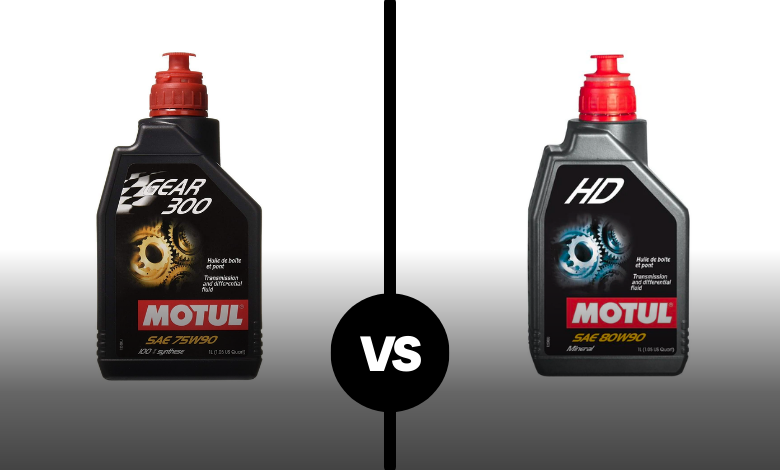75w90 vs 80w90

75w90 vs 80w90 is an important issue for those who are more sensitive to their cars, even though it gives similar results in many areas. Gear oil can be classified according to its thickness and viscosity at different temperatures; the higher its number indicates an oil with thicker viscosity properties.
While 75w90 gear oil is designed to be thin at lower temperatures and thicker at higher ones, making it suitable for limited slip differentials and non-synchronized manual transmissions found on heavy-duty vehicles, 80W90 multigrade SAE gear oil is specially formulated to withstand winter conditions.
We will compare different features for 75w90 vs 80w90.
What is 75w90?
75w90 gear oil can be found in axles and transmissions. Due to its higher viscosity than other forms of gear oil, 75w90 has the ability to resist wear better in extreme temperatures while being shear stable so as to withstand higher loads in gearboxes. Although more costly than similar alternatives, its superior protection and performance justify its extra expense.
Furthermore, its anti-oxidation protection keeps gears clean and protected while helping fuel economy by up to 0.5% when compared with similar options; making 75W90 an excellent choice for anyone seeking maximum vehicle performance.
What is 80w90?
With its lower operating temperature and good fluidity at lower temperatures, it features excellent load carrying capacities. Ideal for light commercial vehicles, 4WDs, trucks and earth moving equipment alike.
Differences Between 75w90 vs 80w90
75w90 vs 80w90 is one of the most curious comparisons about motor oil in recent years. Although gear oils are all liquids, their qualities may differ considerably based on factors like their grade number or SAE number, usage characteristics and configuration needs.
80w90 multigrade oil is designed to meet the demands of passenger cars, trucks, 4WDs and light commercial vehicles alike. Ideal for both summer and winter use due to its ability to tolerate extreme temperatures; additionally it features good shear stability and strong foam resistance properties.
SAE 80W90 gear oil is made of mineral oil and requires more frequent maintenance to preserve its viscosity over an extensive temperature range, however it should be noted that low condensation temperatures cause it to degrade quickly, rendering it ineffective against cold environments. A superior synthetic option would be 75w90 which provides better protection at extreme temperatures while being compatible with limited slip differentials and transmissions, however both should be chosen depending on your vehicle to prevent engine and transmission damage. 75w90 vs 80w90 are not dramatically different products from each other in terms of price.
Both 75w90 and 80w90 multigrade oils provide optimal performance across a wide variety of weather conditions, boasting high operating temperature ranges and capable of withstanding heavy pressures. While 80w90 may overstress your engine, so only use it for specific applications.
75W90 Gear Oil stands apart from its competition by featuring adhesives designed to prevent premature wear and tear in gear components, while remaining non-foaming and reliable for motorsport use. Furthermore, its unique heat control properties help minimize depreciation rates in racing cars. It is enough to mention these for 75w90 vs 80w90.
Dexos Oil vs Synthetic is also one of the curious comparisons.
Can I Use 80w90 Instead of 75w90?
If you want the optimal synthetic gear oil for your car, 75w90 should be your go-to option. It provides superior fluidity, low-temperature efficiency and protection in high temperatures while still offering adequate fluidity in low temps. In addition, 75w90 helps avoid oxidation and thickening that could compromise hardware or hinder performance – ideal for winter driving and limited slip differentials.
80w90 synthetic gear oil is designed for cold weather conditions and offers excellent oxidation and thermal stability, as well as having a low pour point. Furthermore, its thick viscosity index and viscosity index make it suitable for heavy-duty applications like manual transmissions, axles of spirals and some heavy-duty vehicles; its strong foam resistance protects parts against corrosion while its strong foam defense provides corrosion defense for many parts of its application area. This is a good example for 75w90 vs 80w90.
Moreover, 80w90 can lubricate all drive applications as well as conventional and limited slip differentials for conventional differentials or limited slip differentials respectively.
Can you mix 75w90 and 80w90?
Mixing 75W90 and 80W90 gear oils, since their additives are similar, is possible; however it’s advisable to consult your mechanic first as using an improper type of gear oil could damage seals and gaskets on your car. Also keep in mind changing out your oil every 5,000 miles to maintain proper lubrication; additionally it would be prudent to consider your driving habits when selecting an 80W90 oil as this will provide more protection against wear-and-tear damage.
Though these two gear oils may be mixed, it is wise to consult your vehicle’s manual before doing so. Mixing incorrect oils may damage seals and gaskets on your car. Furthermore, using appropriate gear oil for both differential and transmission purposes is critical to their function.
Which one is better: 75w90 vs 80w90?
75w90 gear oil is an ideal option for anyone seeking to improve the performance of their vehicle. Boasting an extended temperature range and designed for heavy-duty applications, its anti-wear additives help prevent premature wear and tear and wear and tear over time.
One advantage of 75w90 gear oil is that it is safe for use in both cold and hot temperatures, though mixing different kinds can cause irreparable damage to components in your car’s engine. Therefore, it’s recommended that you stick with what was recommended by your owner’s manual.
80w90 gear oil is an economical synthetic product designed for various automotive uses. With excellent thermal stability and oxidative resilience, 80w90 can easily withstand temperatures as high as 140degC while remaining cold-resistant up to -40degC for winter driving conditions.
Just like this detailed comparison, you can also take a look at 10w30 vs 5w20.
